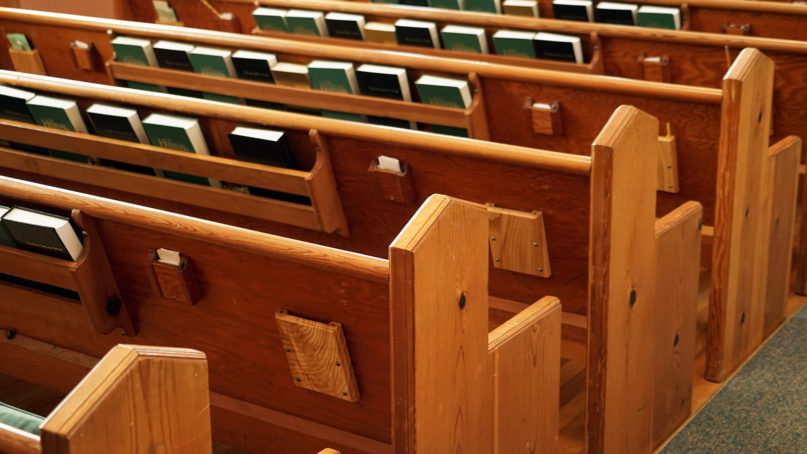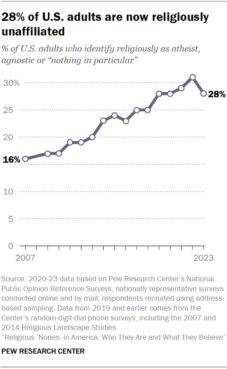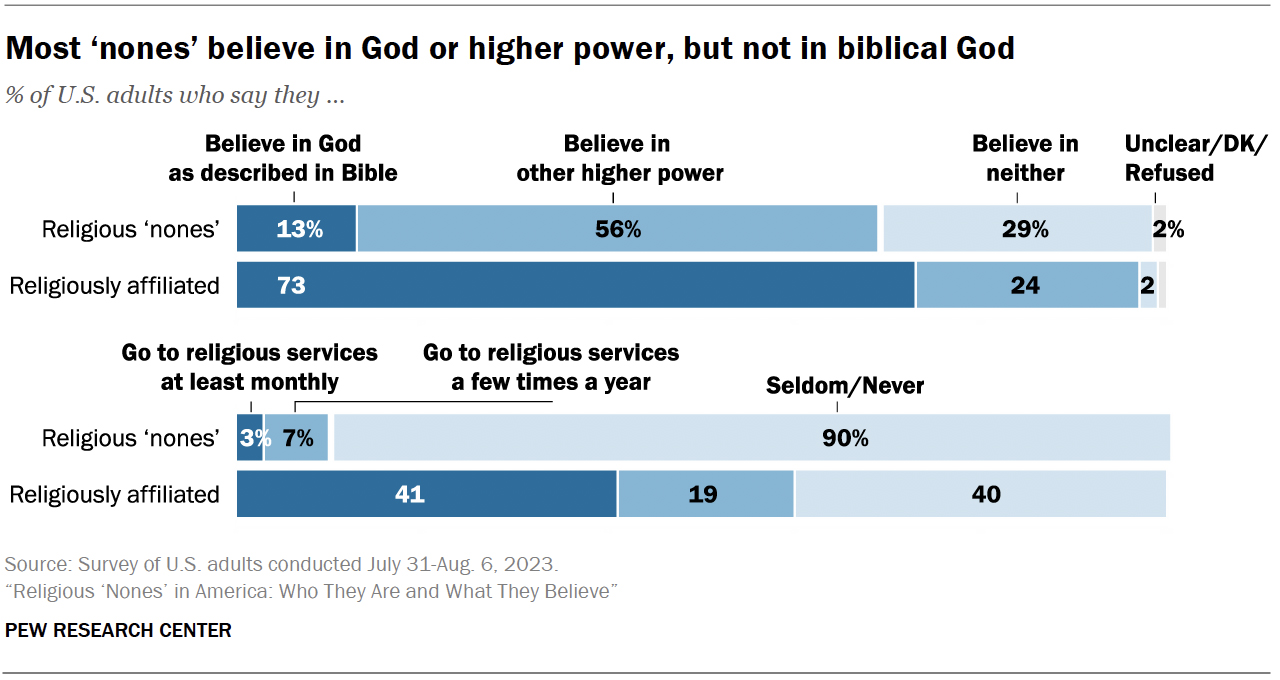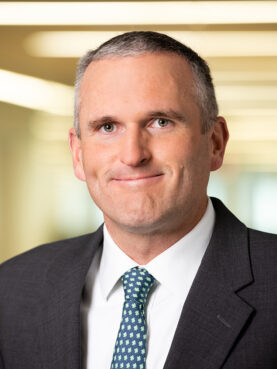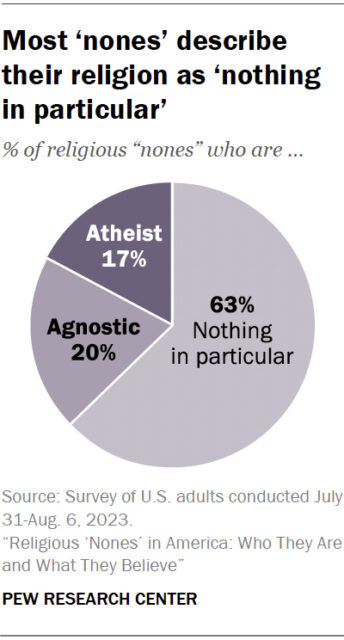(RNS) — America’s religiously unaffiliated, or “nones,” are largely defined by what they are not, rather than what they are. So as they’ve multiplied, it’s perhaps unsurprising that they’ve also been shrouded in myths and misconceptions.
They’ve sometimes been pegged as a group that’s wholly secular and hostile to religion, or conversely as a cohort that has uniformly adopted spirituality rather than religion. They’ve also been characterized as morally directionless or civically disengaged.
A new Pew Research Center report on America’s nones shows the truth is more complicated.
“Just like there’s many differences among religious people, turns out there are many differences among non-religious people, too,” said John Green, professor emeritus of political science at The University of Akron and an adviser on this study. “And I think this report adds some real substance to that.”
In fact, sociologist Ryan Cragun suggests that the report shows America’s nones aren’t much different from the rest of the American public — at least not anymore.
“28% of U.S. adults are now religiously unaffiliated” (Graphic courtesy Pew Reseach Center)
“In the 1980s, the nones actually looked pretty different. They were small, they were 5 to 7% of the U.S. population, disproportionately male, disproportionately white, very young. Not likely to be married. Highly educated, pretty high incomes,” said Cragun, a professor at the University of Tampa who is also an adviser on this study. “Today, the nones kind of look like everybody else.”
“At some level, we’re saying, hey, actually, this is just your neighbor,” he added.
Pew’s findings, which come from a survey of 11,201 respondents conducted in the summer of 2023, show that, at 28%, a 12 percentage point increase since 2007, the religiously unaffiliated cohort now makes up a sizable portion of the U.S. population. They’re also still leaning young and democratic, with 69% under the age of 50 and 62% of nones identifying as Democrats or leaning toward the Democratic Party. But in contrast to where they were 40 years ago, today’s religiously unaffiliated are roughly split between men and women, and their racial makeup broadly mirrors that of the general population.
Pew’s study shows many nones do believe in something, even if it doesn’t fall into traditional religious categories. While 20% say they are agnostic and 17% identify as atheist, the majority of nones (63%) fall into the more ambiguous “nothing in particular” category. And though only 13% say they believe in the God of the Bible, more than half (56%) say they believe in some other higher power.
“There can be a temptation to assume that all religious nones are non believers … that they must all have secular worldviews,” said Greg Smith, associate director of religion research at Pew and the primary researcher for this study. “And this report shows that’s not really true.”
About half of nones say they are spiritual, or that spirituality is very important to them. And, Green pointed out, not all of them are hostile to religion. Though 43% of nones say religion does more harm than good in society, 41% say religion does equal amounts of harm and good.
“Most ‘nones’ believe in God or higher power, but not in biblical God” (Graphic courtesy Pew Research Center)
Though these findings reveal more about the beliefs and spiritual inclinations of the nones, Cragun cautioned that further research is necessary, especially because the current study doesn’t pinpoint exactly what respondents mean when they say they are spiritual or believe in a higher power. While some might see spirituality or a higher power as connected to the supernatural, others could see spirituality as grounded in something more tangible, like nature.
The study also shows that while about half of the nones are spiritual, the other half say they are not, and by many measures the group still remains distinctly non-religious. A full 90% seldom or never go to religious services, 71% say they seldom or never pray and 81% say religion is not too important or not at all important in their lives.
Greg Smith. (Photo © David Hills)
“The religious nones certainly are not all non-believers, but they are way less religious on average than people who identify with a religion,” said Smith. “Religious nones, by and large, are really disconnected from religious organizations of any kind.”
Despite their disengagement from institutional religion, the report debunks the myth that religious nones lack a moral framework. More than 8 in 10 (83%) say the desire to avoid hurting people is key to helping them decide between right and wrong, and about the same number, 82%, say they also rely on logic and reason. “Almost all of those people have very clear moral understandings of the world,” said Cragun.
The report confirms that, on the whole, nones are less civically engaged than their religiously affiliated peers (less likely to volunteer, less likely to vote), but it also complicates that narrative. Of religiously affiliated Americans, those who attend religious services at least once a month are more likely to volunteer than those who don’t attend services regularly. And of the nones, atheists and agnostics turn out to vote at rates that are similar to the religiously affiliated.
“It’s those who described their religion as nothing in particular who tend to be less civically engaged,” said Smith. “So there’s differences within the nones between atheists and agnostics on the one hand, and nothing in particular on the other.”
“Most ‘nones’ describe their religion as ‘nothing in particular’” (Graphic courtesy Pew Research Center)
Civic engagement isn’t the only point on which the “nothing in particulars” differ from atheists and agnostics. Atheists and agnostics include far more men than women and are more likely to be white, to have more education and to identify as Democrats or lean toward the Democratic Party than those who said they were “nothing in particular.”
Green suggested that one reason for these divisions, at least in the civic engagement category, is because atheists and agnostics have a firmer belief system than those who select “nothing in particular.”
“People who believe in things are much more likely to generate high levels of what social scientists called social capital by belonging to organizations, by associating with like-minded people. And from that social capital comes all types of activities — political activities, volunteering, charitable giving. But people who are defined by what they’re not are much less likely to have high levels of social capital.”
Nancy Ammerman, professor emerita of sociology of religion at Boston University and an adviser on the study, suggested that while atheists and agnostics are those who have the privilege to go against social convention and reject religious affiliation, the “nothing in particular” group is likely made of people who don’t fit the social and cultural stereotypes of the common churchgoer.
“What goes along with that is that they’re likely to have fewer resources. They’re more likely to be single, not to have children at home, to be less well educated, as we see in this study, and just generally to be more marginal to social institutions in general,” Ammerman told RNS.
While many questions about the nones remain, the report makes two things clear: the nones are not monolithic, nor are they going away any time soon.
